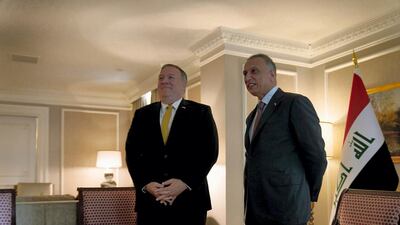US Secretary of State Mike Pompeo vowed to help Iraqi rid itself of rogue militias on Wednesday as he hosted Iraqi Prime Minister Mustafa Al Kadhimi in Washington.
The US Secretary of State took part in meetings totalling almost four hours with his Iraqi counterparts as part of an ongoing strategic dialogue between the two nations.
The first round of meetings, which will focus on economic, educational, energy and development co-operation between the two nations, was led by Iraqi Foreign Minister Fuad Hussein. This was followed by a meeting between Mr Pompeo and Mr Al Kadhimi.
Both Mr Pompeo and Mr Hussein emphasised the need to boost Iraqi sovereignty and counter militias including those funded and armed by Iran.
"Armed groups not under the full control of the prime minister have impeded our progress,” Mr Pompeo said in a press conference after the meetings.
“Those groups need to be replaced by local police as soon as possible. I assured Dr Fuad [Hussein] that we could help and that we would help,” he added.
The offer of assistance was backed up by $204 million in humanitarian aid to Iraq.
“This funding includes nearly $133 million from the State Department’s Bureau of Population, Refugees, and Migration and more than $71 million from USAID’s Bureau for Humanitarian Assistance,” the US State Department said.
The aid cash will provide "critical shelter, essential healthcare, emergency food assistance, and water, sanitation, and hygiene services across Iraq," the statement added.
Mr Pompeo, who said he anticipated new deals in the field of energy to be announced today between the US and Baghdad, refused to comment on US redeployments in Iraq.
The Trump administration is considering withdrawing some of the 5,200 troops in the country, the New York Times reported last week.
The head of US Central Command, General Kenneth McKenzie recently blamed the rocket attacks by pro-Iranian militias on tactical withdrawals of US troops from Iraq.
”The threat against our forces from Shiite militant groups has caused us to put resources that we would otherwise use against ISIS to provide for our own defence,” he said. "We've had to pull back, our partners have had to pull back.”
Without mentioning Iran by name, Mr Hussein said Iraq is seeking normal relations with “no interference” with all its neighbours.
The US also on Wednesday “expressed support for a budget agreement between the federal and Kurdistan regional governments, as well as proposed early elections next year,” a statement by the State Department said.
Mr Al Kadhimi’s visit to Washington is the highest ranking for an Iraqi leader since 2017. The Prime Minister has already taken steps against corruption and against militias that were praised by US officials.
“Mr Al Kadhimi is perhaps the last, best hope for the US to have an Iraqi prime minister who can take on Iran's influence in Iraq,” Nicholas Heras, the director of the Middle East Programme at the Institute of the Study of War told The National.
“What sets him apart from his predecessors is that he came into the premiership with a strong vision for how he wants to tackle Iraq's major challenges: endemic corruption, Iran-backed militias, collapsing infrastructure, economic malaise, and a youthful population that has lost patience with Iraq's sclerotic sociopolitical system.”
US officials say Mr Al Kadhimi has asked them for patience as he tackles Baghdad’s toughest challenges.
“He comes to Washington as the culmination point of the Trump team's hard-built Iraq policy: to send the signal that the US has a partner it will eagerly work with in Iraq, and a man the US believes can slay the hydra of Iran's militia proxies that threaten the US in Iraq and the region,” Mr Heras added.
US President Donald Trump is due to meet Mr Al Kadhimi on Thursday at the White House.


